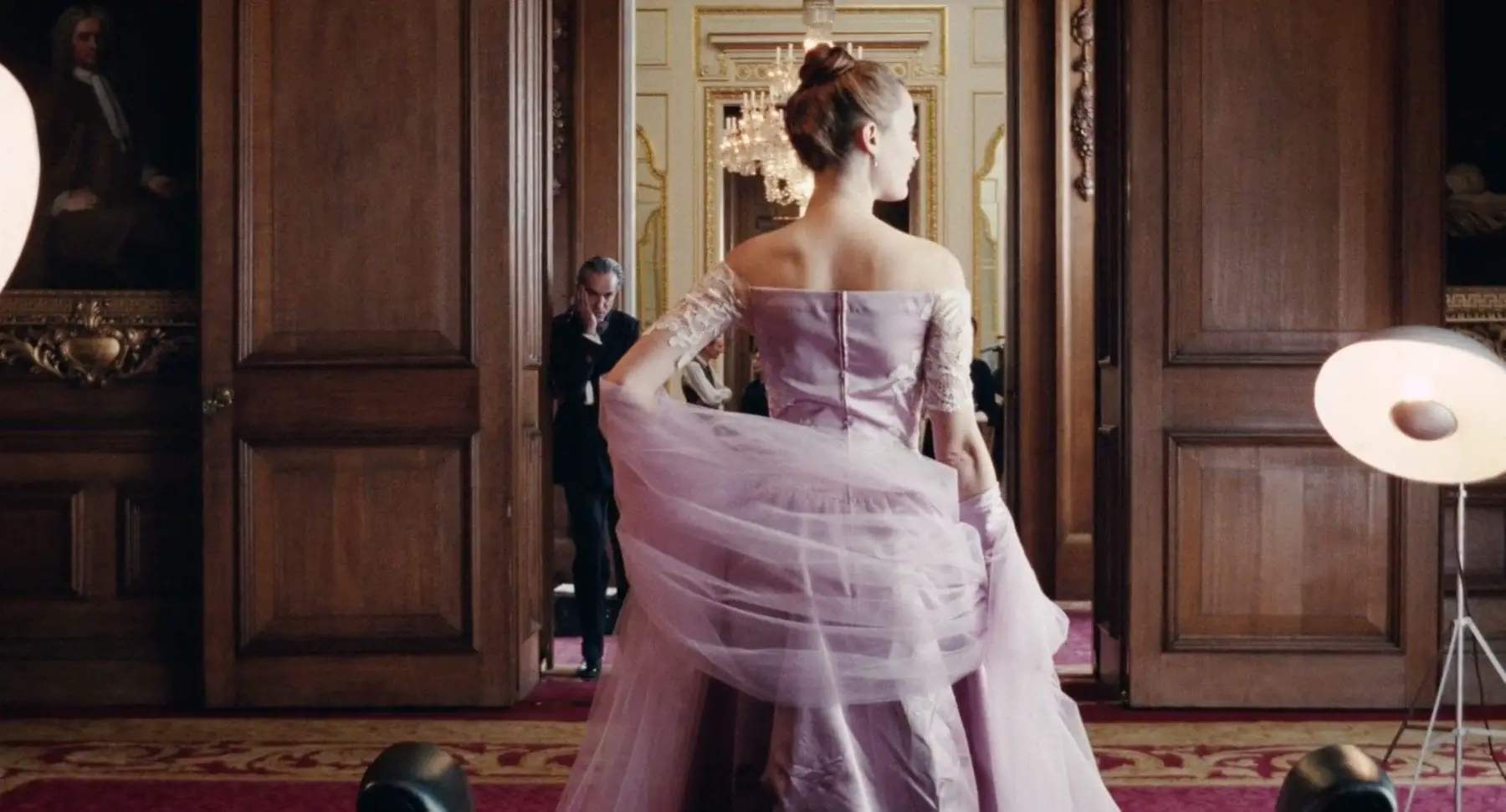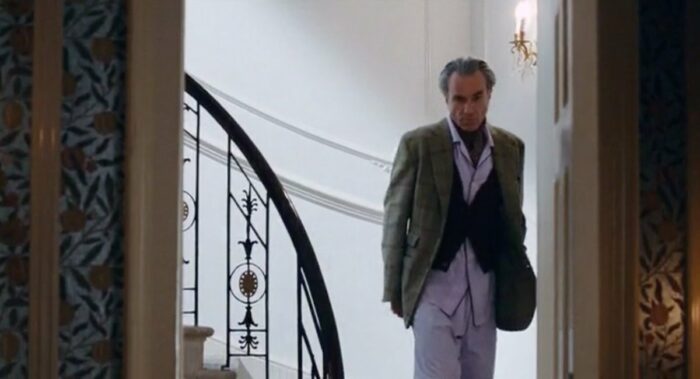Arthur: Well, this was some meet-cute.
Iris: Sorry?
Arthur: lt’s how two characters meet in a movie. Say a man and a woman both need something to sleep in. And they both go to the same men’s pyjama department.
Iris: Right.
Arthur: And the man says to the salesman: ”l just need bottoms.” The woman says, ”l just need a top.” They look at each other, and that’s the ”meet-cute.” – The Holiday (2006, dir. Nancy Meyers)
Genre can turn on a dime. In the case of 2017’s Phantom Thread, it flips and twists, and shifts whenever you get comfortable, just so Paul Thomas Anderson can keep you on your toes. It’s not the first time he’s done this—he’s staked his career on it. From the off-beat romance and gangster drama of Punch-Drunk Love, to the satire-come-horror story of The Master, Anderson understands how to disguise genre within prestige trappings. It just so happens that Phantom Thread plays with this idea the most obviously.
A truly wonderful experience, once you’ve been converted to loving this beautiful, funny, weird film is to watch other people watch it for the first time. To see the confusion dawn upon their faces as Alma’s story refuses to conform to just about any conventions. I’ve done this twice now—once with my mother, and once with my friend. The intake of breath from the audience at the film’s punchline, “Kiss me, my girl, before I’m sick”, never fails to make me grin. The film won, and the audience kind of lost. But in a broader sense, we won as well.
When pitching this film to friends and family, curious about how evangelical about it I have become, I’ve described it as “Jane Eyre, but as a rom-com”. I stand by that. It’s the closest thing I can come to describing its genre beyond “a period drama, but weird about it”. Because it’s not weird, it’s actually very conventional, when you take it as a given that, at its core, Anderson and Daniel Day-Lewis’ (possibly) final collaboration, is a romantic comedy.
After all, how else to describe the moment of Reynolds and Alma’s first meeting, when she trips over her own feet as she waits tables and then takes his absurdly long breakfast order, other than a meet-cute? They gaze into each other’s eyes throughout the scene, with Reynolds testing Alma – first seeing if she baulks at or questions his genuinely ridiculous (I cannot emphasise that enough, it’s insane) breakfast order, then making the examination explicit by making her bring him his order without her notes. Of course she passes the test, of course she addresses him for the first time as “the Hungry Boy”. It wouldn’t be much of a romantic comedy if she fell at the first hurdle.

The rest of the film follows the structure of a romantic comedy, from the courtship, to their petty arguments, to Alma earning the grudging respect of Reynolds’ sister Cyril (the incomparable Leslie Manville’s delivery of “Don’t start a fight with me, you won’t get out alive” will be with me until the end of my days). In a nod to When Harry Met Sally, there’s even a New Years’ Eve party, central to the plot. I’ve written before about the central importance of a “grand romantic gesture” to a romantic comedy, for better or worse, and Phantom Thread has my favourite variation on this in its climax. It’s an excruciatingly long scene as Alma prepares Reynolds his mushroom omelette, with Jonny Greenwood’s score overpowering the rest of the action.
You’re left wondering ‘When is he going to realise? How will he react to the discovery that his omelette is made from poison mushrooms? Does she intend to kill him?’ throughout as Alma pours a glass of water, imbuing the action with far more drama and tension than necessary. Like all instances of food and consumption in this film, it’s pointed, tense, and awkward. The audience squirms in discomfort. I still wince as Reynolds takes a bite out of the omelette, chewing it with smug satisfaction. And then Alma explains, slowly, what’s about to happen to him, Vicky Krieps’ voice dropping to the point where you’d be forgiven for assuming she’s talking about sex.
What’s the difference, really, between sex and mildly poisoning your husband, after all? Especially when he’s unquestionably into it.
“Kiss me, my girl, before I’m sick” is where the tension finally breaks, when you’re free to laugh and release an entire film’s build-up of discomfort. Jordan Peele has been praised for his awareness of the fine line between comedy and horror, with both genres dependent on tension and timing, and Anderson made a film that functions as both.
Romantic comedies take women seriously. If there’s one genre where women can, and should, be the centre of the action and the driver of the plot, it’s a romantic comedy. Rooted in heteronormativity and sexist stereotypes, to be sure, but romantic comedies have always been about negotiations of power dynamics in a relationship, Phantom Thread just makes that struggle and negotiation more explicit. Alma is certainly the primary agent of the plot, narrating her story to the baby-faced doctor (undoubtedly freaking him the hell out), and repeatedly forcing Reynolds to be flat on his back.
She drives the relationship forward whether he likes it or not, insisting on forcing him out of his routine, convincing him to take “their” dress back from a client she found offensive, and literally getting in the driver’s seat when she senses he would be amenable to it. The closest Reynolds comes to taking back that power is in their disastrous surprise dinner date, as he sits there in the greatest passive-aggressive Date Night outfit of all time – consisting of a waistcoat over his pyjamas, paired with a cravat and a scowl as he pokes at his asparagus.
It’s so telling that this scene also shows Reynolds at his most childish, as he goads Alma, “Are you a special agent sent here to ruin my evening and possibly my entire life?” he snidely comments (Side note: I quote that line all the time now). “Everything’s a game to you!” Alma tells him when she finally blows up at him, acutely aware of the precarious balance of power between them. She’s an immigrant woman in post-Second World War Britain, living in his luxurious London house, and every part of her life is dependent on either keeping him happy or learning to control him.
Luckily for her, Alma is clever enough to recognise Reynolds’ central flaw from the start – he’s an overgrown child. “I think you only act strong”, she tells him the night of their first date, “No, I am strong”, he replies in the sort of voice that you’d expect a seven year old to use to proudly tell you that he’s a big boy now.
Anderson has recognised the core flaw of romantic comedies as they are today – populated with men incapable of acting like mature adults, and women acting more like their mother than their lover. This is made explicit with Reynolds’ fixation on his mother and her wedding dress that he made for her, wearing his Freudian heart on his sleeve.
You would be forgiven for missing this on a first viewing, I was too preoccupied with Alma to notice it much at first. For most of the film, the audience is aware of the power imbalance in Reynolds and Alma’s relationship, he wipes off her lipstick over dinner so he can “see her face” and then makes her stand in his attic wearing nothing but her slip as he takes her measurements for a new gown. Any woman or man with any empathy would cringe at those scenes, worried for this girl as she deals with a man much older and wealthier than her.
But Alma doesn’t need our patronising concern, she makes it clear from the start that she enjoys the tug of war between them when she tells him “If you want to have a staring contest with me, you will lose”, teasing him by the fire after their first dinner together. By the end of the film, Alma is proved right – Reynolds definitely lost the staring contest, he blinked first, not that he seems to particularly mind.
I’m hardly the first person to pick up on the film’s formal similarities to a romantic comedy. Shortly after the film came out, Nelson Carvajal re-edited the trailer to look like a romantic comedy VHS from the ’80s. Not that that required much effort, simply changing up the accompanying music and text by reframing Reynolds as a perennial bachelor about to have his life turned upside down by this vibrant young woman who trips into his life, which is hardly stretching the truth of it.
The Twitter account Phantom Thread Out of Context posts subtitled screencaps from the film, which just emphasises the amount of food-related sounds that dominate the film. Removing the film from its period drama, ‘Oscar-bait’ costumes and talent context just makes the level of comedy that much more obvious. Alma’s teeth clinking on her spoon as she eats porridge, Reynolds’ numerous deep sighs and the sceptical arch of Cyril’s eyebrow as Reynolds rants about “fucking chic” as the worst thing to happen to fashion are all very much intended to be funny.

I don’t need to explain the joke, though. Instead, let us appreciate that Paul Thomas Anderson understands romantic comedies far better than most. He gets that they are about power, and the absurd ways that power is played out. I called Phantom Thread “Jane Eyre, but as a rom-com”, but I’m not sure how accurate that is anymore. Charlotte Bronte made Mr Rochester lose his sight to make him dependent on Jane so that their power dynamic could be evened out. Paul Thomas Anderson has Alma poison Reynolds because it’s kind of funny and weirdly sweet. That’s an important distinction to make.
Anderson took a genre that is derided for its shallowness, stereotypes, and formula, and used it to create a film that toys with the audience. It’s a weird romantic comedy, to be sure, but by the end, Anderson’s convinced us to embrace it with all the delight of Reynolds enjoying his mushroom omelette.


